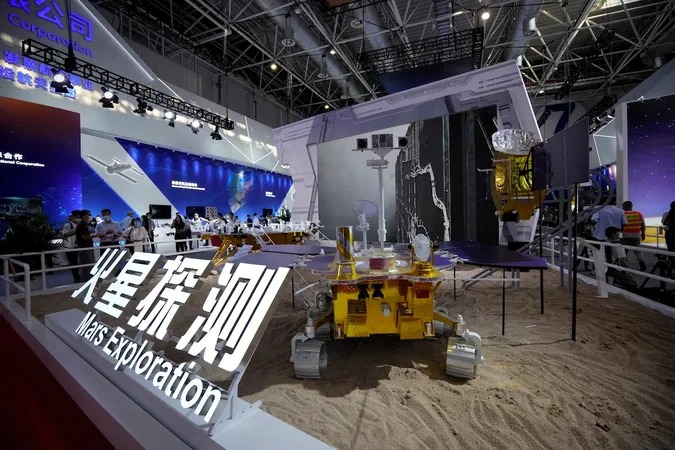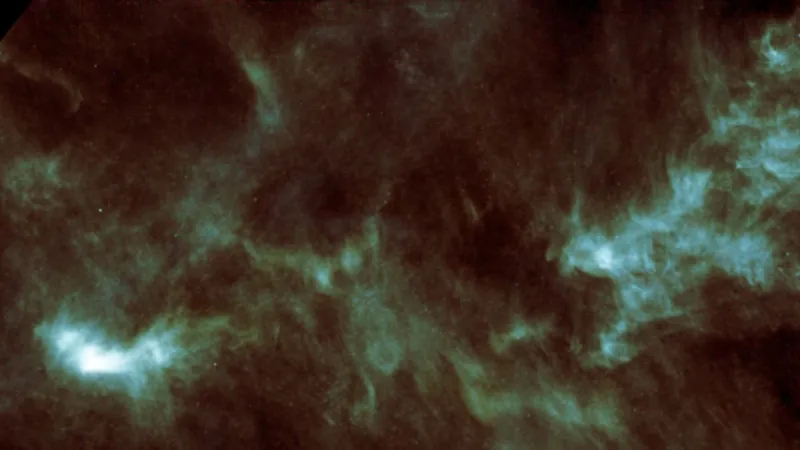
Breakthrough Discovery: China’s Zhurong Rover Unveils Secrets of an Ancient Martian Ocean!
2024-11-07
Author: Emily
In an exciting revelation, scientists have uncovered compelling evidence suggesting that Mars was once engulfed by an ocean billions of years ago, thanks to China’s Zhurong rover. This groundbreaking find continues to reshape our understanding of the red planet, moving it from the barren world we know today back to a time when it may have supported life.
On Thursday, researchers announced that data collected by the Zhurong rover, which has been operating in the northern lowlands of Mars since its landing in 2021, alongside information from orbiting missions, revealed geological features that are consistent with an ancient coastline. The rover’s analysis focused on Utopia Planitia, a vast plain situated in Mars' Northern Hemisphere.
Key to the discovery were several geological formations that point to the existence of a historical ocean. The evidence includes notable features such as troughs and sediment channels often found in coastal environments, alongside mud volcano formations. These findings indicate that there were both shallow and deeper marine ecosystems thriving during an era when Mars had begun to transition into the harsh, dry landscape observed today.
Recent investigations estimated that the Utopia Planitia was flooded by an ocean around 3.68 billion years ago. However, this body of water likely became frozen shortly afterward, leading researchers to theorize that it vanished by approximately 3.42 billion years ago. "The water was heavily silted, leading to distinctive layering structures in deposits," noted Sergey Krasilnikov, a planetary scientist involved in the research.
Mars, like Earth and its neighboring planets, formed approximately 4.5 billion years ago. At the time the ocean existed, Mars was likely already undergoing significant changes, drifting away from its initially hospitable conditions. The presence of liquid water raises tantalizing possibilities that microbial life could have once flourished on the planet. "In the early stages of Mars' history, when a thick, warm atmosphere may have prevailed, microbial life was much more feasible," Krasilnikov explained.
This breakthrough also ties into ongoing initiatives by various space agencies to pinpoint the fate of water that once occupied Mars' surface. In a related study published in August, seismic data from NASA’s InSight lander revealed hints of a significant reservoir of liquid water possibly lying beneath the Martian surface, contained within fractured rocks.
The solar-powered Zhurong rover, which derives its name from a mythical Chinese fire god, began its Martian exploration with six scientific instruments in May 2021. After exceeding its planned three-month mission duration, the rover went into hibernation in May 2022, possibly due to excessive sand and dust accumulation.
These exciting developments not only bolster theories about the ancient Martian ocean but also propel us toward further inquiries about what other secrets Mars might hold. As the quest for extraterrestrial life continues, the implications of water's presence in Mars' past offer hope of discovering whether we are alone in the universe.
Stay tuned for further updates on Mars exploration as more revelations from the red planet unfold!









 Brasil (PT)
Brasil (PT)
 Canada (EN)
Canada (EN)
 Chile (ES)
Chile (ES)
 España (ES)
España (ES)
 France (FR)
France (FR)
 Hong Kong (EN)
Hong Kong (EN)
 Italia (IT)
Italia (IT)
 日本 (JA)
日本 (JA)
 Magyarország (HU)
Magyarország (HU)
 Norge (NO)
Norge (NO)
 Polska (PL)
Polska (PL)
 Schweiz (DE)
Schweiz (DE)
 Singapore (EN)
Singapore (EN)
 Sverige (SV)
Sverige (SV)
 Suomi (FI)
Suomi (FI)
 Türkiye (TR)
Türkiye (TR)